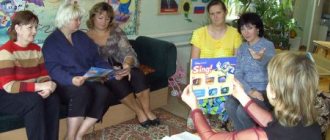Klimenko Tatyana Grigorievna Deputy Director for educational work of the Municipal government institution of additional education "Center for Children's Creativity" p. Divnoe, Stavropol region. The work is intended for teachers of additional education. One of the tasks facing teachers is the need to provide “psychological and pedagogical support to the family and increase the pedagogical competence of parents, psychological support for the development of the child in the context of the family and educational institution.”
Parent Engagement Program
"We are together"
Explanatory note
The specificity of the institution of additional education for children is to fulfill the state order for the socialization of children, to promote their spiritual and moral development, to create additional prerequisites and unique opportunities for the upbringing, intellectual and creative development of children with the active involvement of the family in this process.
The relevance of this program is that it outlines the main forms and methods of interaction between institutions of additional education of children and parents of students, since without help, no educational institution can provide high educational results. Here, in relation to the institution, the family no longer acts only as a social customer, but also as a partner.
The family is the most important institution for the socialization of younger generations. It represents the personal environment of life and development of children, adolescents, and young men, the quality of which is determined by a number of parameters of a particular family.
These are the following parameters:
Demographic – family structure (large, complete or incomplete, small or large).
Socio-cultural – educational level of parents, their participation in society.
Socio-economic – property characteristics and parents’ employment at work.
The study of the indicated parameters occurs using various methods, such as questionnaires, testing, interviews, conversations, and observations. The information obtained makes it possible to clarify the characteristics of the family, outline forms of cooperation, as well as the content of educational work.
In this regard, one of the tasks facing teachers is the need to provide “psychological and pedagogical support for the family and increase the pedagogical competence of parents, psychological support for the development of the child in the context of the family and educational institution.”
Modern parents consider the institution of additional education for children not only as a place for developing a child’s hobbies and organizing his leisure time, but also, above all, are interested in the child’s educational success and are aimed at a clear and intelligible educational result. Therefore, for a teacher of additional education, it is very important to establish partnerships with parents, create an atmosphere of support and community of interests, mutual understanding, cooperation and interaction.
An additional education teacher can and should become an authority who influences the formation and development of a child. But the work of a teacher becomes much more effective and efficient when he involves parents in joint and complementary educational activities.
The novelty of the program is the proposal to the parent community to build relationships between the family and the educational institution through interaction and partnership. This means cooperation between teachers and parents aimed at developing a creative atmosphere that is interesting for all subjects of the educational process.
The work of an additional education teacher with a family should be implemented in the following areas: studying the family, psychological and pedagogical education of the family, organizing joint activities, and involving parents in managing the educational process.
Goal: interaction between the Center for Children's Creativity and the Family;
establishment of interested dialogue and cooperation.
Tasks:
— psychological and pedagogical support for the family and increasing the pedagogical competence of parents, psychological support for the development of the child in the context of the family and educational institution;
— creating conditions for interaction between teachers, parents and children for the development and education of a healthy personality based on a single pedagogical position, strengthening families, preventing negative behavior, improving the pedagogical culture of parents, organizing meaningful leisure;
— a system of activities that allow parents to become more familiar with the specifics of the institution’s work and introduce them to the educational and developmental environment;
— parents’ awareness of the role of family education, the type of educational relationships in the family, the development of a positive style of family education.
Main priorities for program implementation:
— mobility – quick response to the needs of society, expansion of activities, development of new variable programs;
— personification of educational and upbringing processes, the child is at the center of interests of both the teacher and parents;
— professionalism of the teaching staff;
— integration with other social institutions;
— methodological support of the educational process.
Performance criteria:
— parents’ satisfaction with the quality and quantity of forms of interaction with the teaching staff, participation in the creative life of children’s groups and institutions;
— inclusion of parents in the educational process;
— positive feedback from teachers and parents about the results of activities:
— the presence of an effective system of interaction, parents are active participants in the life of the institution.
Implementation mechanism:
The mechanism for implementing the program is the formation of a single educational team of parents, teachers, students and the developing environment based on information interaction and co-creation in collective creative activity. Involving parents in active participation in managing the educational process.
The main idea of the mechanism for implementing the program is a dialogue discussion of the significance and conditions for the child’s creative development, and to encourage parents to develop together with the child.
The institution uses the following forms of work with families:
1. Interactive
2. Traditional
3. Educational
4. State-public.
Work with parents includes a set of measures - various forms of psychological education, training, counseling, prevention, which help adults understand their role in the development of family ties, better care for the well-being of the child, develop him intellectually, socially, sensory, ethically, aesthetically. .
The interaction of the teacher with parents serves to maximize their involvement in the educational process, forming their position as a subject of this process. This will change the ideas of many modern parents about their role in the life of a child, which is mainly limited to providing financial support for their children. Living together with a child, discussing successes, overcoming failures allows parents to see their son or daughter in a new way, to feel like a significant person for him.
Methods of interaction with parents
- methods of forming the consciousness of the individual (formation of beliefs, views, ideals): conversations, lectures, personal example of adults;
— methods of organizing activities and shaping public behavior: public opinion, instructions, creating educational situations;
— methods of stimulating behavior and activity: encouragement, gratitude, approval.
Clearly organized work with parents is constructive, allowing you to model a unified educational environment in the organization. Since parents are initially the main customers of educational services, teachers need to strive to pay due attention to effective forms of interaction between the organization of additional education and the families of students.
Positive changes that meet the interests of children, their upbringing and personal development occur only where teaching teams combine their professional knowledge with the efforts of the parent community, help the families of students in their cultural and spiritual development, and help strengthen mutual understanding between parents and children.
Social and pedagogical results of working with parents
At the child and parent level:
— resolving personal problems of children and parents;
— increasing the competence of parents in solving pedagogical, psychological and other problems of children.
At the institution level:
— increasing the effectiveness of the educational process by organizing joint work with parents.
Expected results
Active forms of work with parents will give teachers the opportunity to get acquainted with child-parent relationships in the family, create conditions for the formation of partnerships between parents and children, and contribute to the agreed-upon adoption of joint decisions.
Positive changes that meet the interests of children, their upbringing and personal development occur only where teaching teams combine their professional knowledge with the efforts of the parent community, help the families of students in their cultural and spiritual development, and help strengthen mutual understanding between parents and children.
Literature
1. Kozhurova O.Yu. The educational potential of the family as the basis of family pedagogy: educational and methodological manual / O.Yu. Kozhurova, D.V. Grigoriev. – Tula: GOU DPO TO “IPK and PPRO TO”, 2011. – 84 p.
2. Working with families in additional education institutions: an auction of methodological ideas / author. L.V. Tretyakova and others - Volgograd: Teacher, 2009. - 218 p. Il.
3. Forms of work with parents. 5-11 grades / Comp. L.P. Barylkina, T.A. Falkovich, G.I. Tatarenko. – M.: VAKO, 2013. – 160 p.

